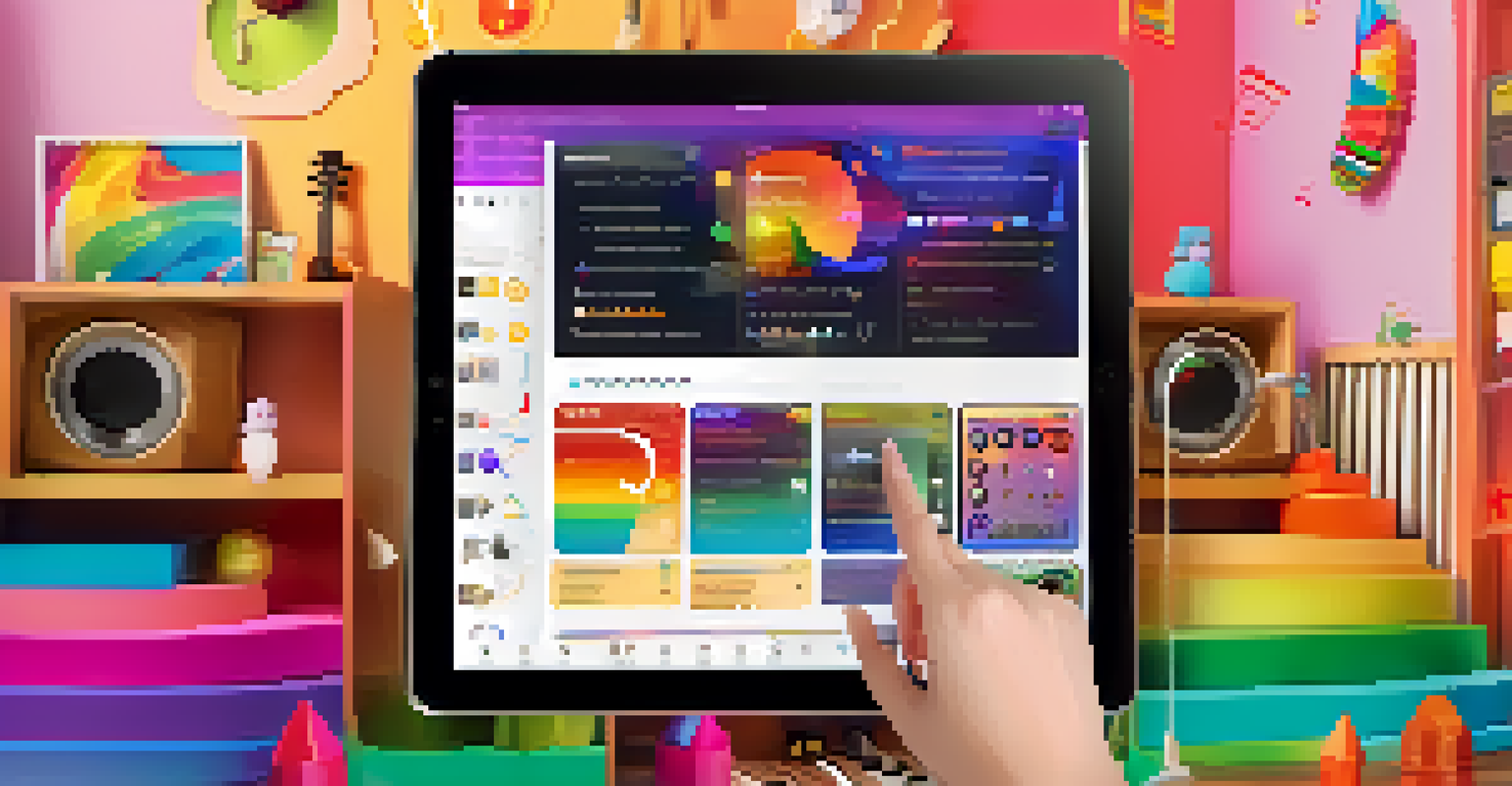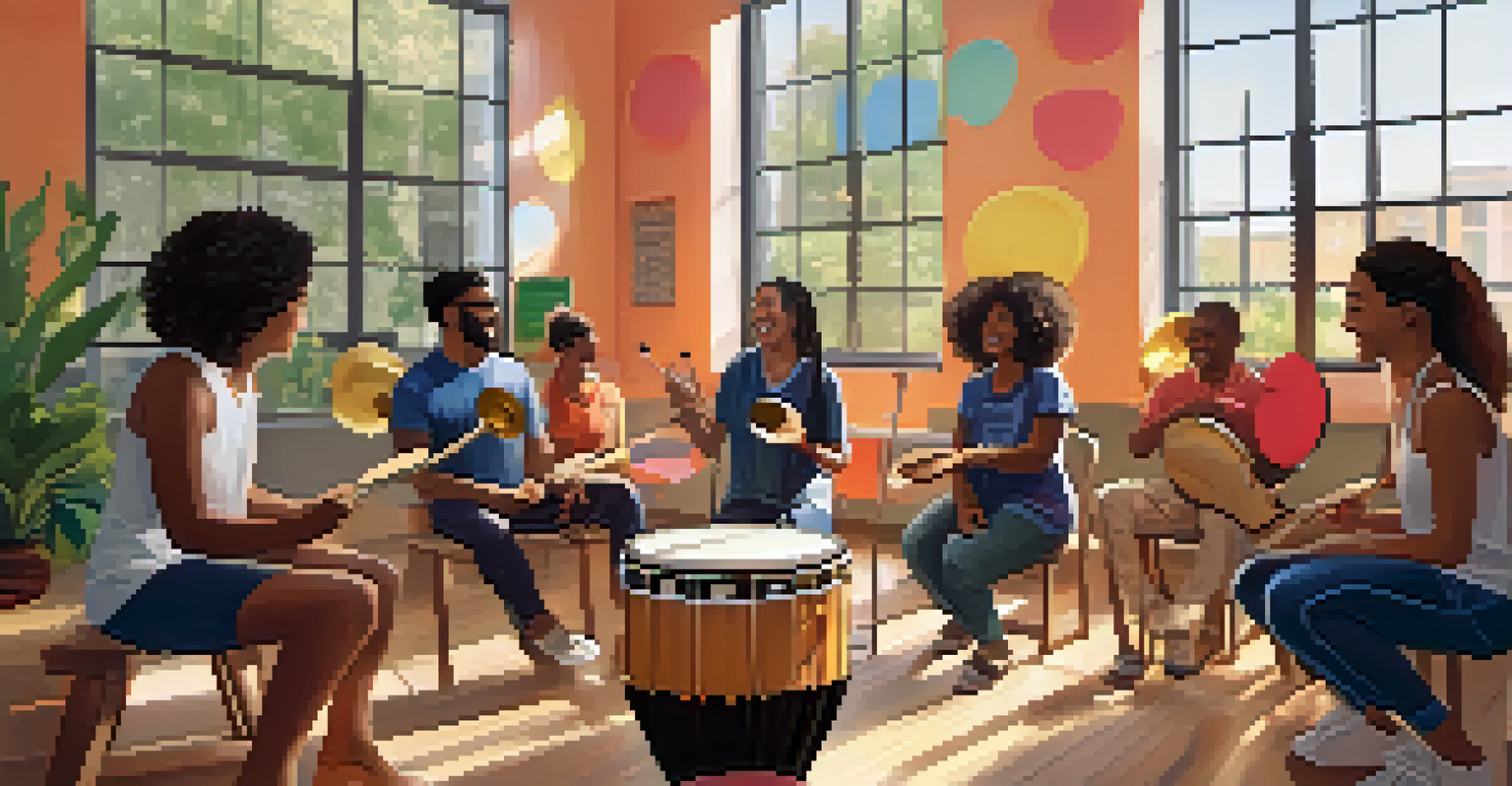AI and Music Therapy: Innovations for Emotional Wellbeing

Understanding Music Therapy and Its Benefits
Music therapy is a clinical and evidence-based use of music interventions to accomplish individualized goals within a therapeutic relationship. It can help individuals manage stress, improve mood, and enhance overall emotional well-being. For instance, playing a musical instrument can serve as a creative outlet, providing a sense of accomplishment and joy.
Music can change the world because it can change people.
In recent years, research has shown that music can significantly impact our emotions and cognitive functions. People experiencing anxiety or depression often find solace in music, which can evoke memories and feelings, making it a powerful therapeutic tool. Whether through listening, songwriting, or performing, music therapy offers diverse methods to address emotional challenges.
With the rise of technology, music therapy is evolving, incorporating innovative tools and techniques. This evolution not only enhances the therapeutic process but also broadens accessibility. For example, online platforms now allow individuals to engage in music therapy sessions from the comfort of their homes, breaking geographical barriers.
The Role of AI in Transforming Music Therapy
Artificial Intelligence (AI) is making waves in various fields, and music therapy is no exception. By analyzing data and patterns, AI can help therapists personalize music interventions to better suit individual needs. This tailored approach can lead to more effective therapeutic outcomes, as it considers the unique emotional and psychological states of each client.

One innovative application of AI in music therapy is the creation of customized playlists. These playlists can adapt based on real-time feedback from clients, ensuring they receive music that resonates with their current emotional state. Imagine having a playlist that evolves as your mood shifts, providing comfort exactly when you need it most.
Music Therapy Enhances Well-Being
Music therapy utilizes various interventions to help individuals manage stress, improve mood, and foster emotional well-being.
Furthermore, AI tools are being developed to compose original music tailored to therapeutic goals. For instance, an AI system can generate soothing melodies designed to alleviate anxiety. This not only enriches the therapeutic experience but also offers clients a unique auditory landscape to explore their emotions.
AI-Driven Music Analysis for Emotional Insights
AI's ability to analyze music and emotions has opened new avenues in music therapy. Advanced algorithms can assess the emotional content of songs, determining what elements evoke specific feelings. This insight enables therapists to select music that aligns perfectly with their clients' emotional needs, enhancing the therapeutic process.
The music is not in the notes, but in the silence between.
Moreover, AI can analyze clients' responses to various musical elements, such as tempo, harmony, and lyrics. By tracking these emotional responses over time, therapists can gain a deeper understanding of their clients' emotional landscapes. This data-driven approach allows for more informed decisions regarding therapy methods and interventions.
Consider a scenario where a therapist uses AI to analyze how a client responds to different genres of music. By identifying patterns in emotional reactions, the therapist can refine their approach, making sessions more engaging and effective. This integration of technology not only enriches the therapeutic experience but also fosters a deeper connection between clients and their healing journey.
Enhancing Engagement Through Interactive Music Apps
Interactive music apps powered by AI are reshaping how clients engage with therapy. These apps often include features that encourage users to create music, play instruments, or even collaborate with others. This active participation can lead to increased emotional expression and personal empowerment.
For example, an app might allow users to compose their own music using guided prompts and AI-generated suggestions. This creative outlet can serve as a cathartic experience, helping users articulate feelings they may struggle to express verbally. Through this process, individuals can discover new aspects of themselves and their emotional well-being.
AI Personalizes Music Therapy
Artificial Intelligence tailors music interventions to individual needs, enhancing the therapeutic experience and outcomes.
Additionally, these apps often employ gamification techniques to make the therapeutic process more enjoyable. By incorporating elements like rewards and challenges, users are motivated to engage consistently, fostering a habit of emotional exploration. The blend of technology and creativity creates an inviting environment for healing.
AI in Group Music Therapy Sessions
AI isn't just transforming individual therapy; it's also making waves in group music therapy sessions. With the ability to analyze group dynamics and individual contributions, AI can facilitate more effective and harmonious group interactions. This technology can help identify which musical elements resonate with the group, enhancing collective emotional expression.
Imagine a group therapy session where AI analyzes participants' reactions to different musical styles, helping the therapist select the most impactful music. This real-time feedback can create a more cohesive and supportive environment, allowing participants to connect on a deeper level. The shared experience of music can foster empathy and understanding among group members.
Furthermore, AI can assist in creating collaborative music projects, where participants co-create music together. This not only encourages teamwork but also strengthens social bonds, making therapy a more enriching experience. The result? A transformative space where individuals find solace and support in each other's musical journeys.
Addressing Ethical Considerations in AI and Music Therapy
As with any technological advancement, the integration of AI in music therapy brings about ethical considerations that must be addressed. Issues such as data privacy, consent, and the authenticity of AI-generated music are crucial to ensure clients' rights and emotional safety. It's essential for therapists to navigate these challenges carefully.
For instance, when utilizing apps that collect user data, therapists must ensure clients are fully informed about how their data will be used. Transparency fosters trust and allows clients to feel secure while engaging with technology. Additionally, ethical guidelines should be established to protect clients from potential misuse of AI-generated music.
Ethics in AI Music Therapy
The integration of AI in music therapy raises important ethical considerations around data privacy and the human element in therapy.
Moreover, therapists should remain aware of the human element in music therapy. While AI can enhance the therapeutic process, it should never replace the empathy and understanding that human therapists provide. Striking a balance between technology and human connection is key to maintaining the integrity of music therapy.
The Future of AI and Music Therapy: A Harmonious Partnership
Looking ahead, the future of AI and music therapy appears promising, suggesting a harmonious partnership that benefits emotional well-being. As technology continues to evolve, we can expect even more innovative applications that address diverse emotional needs. The potential for AI to enhance therapeutic practices is vast, opening new doors for healing.
Imagine a world where AI can predict emotional shifts and offer tailored musical interventions before clients even express their needs. This proactive approach could revolutionize how therapists support their clients, ensuring timely and effective responses to emotional challenges. The possibilities are exciting and inspire hope for the future of mental health care.

Ultimately, the goal remains clear: to enhance emotional well-being through the power of music. By embracing AI as a valuable tool in music therapy, we can create more personalized, engaging, and effective therapeutic experiences. This collaboration may pave the way for a brighter future where emotional health is prioritized and accessible to all.